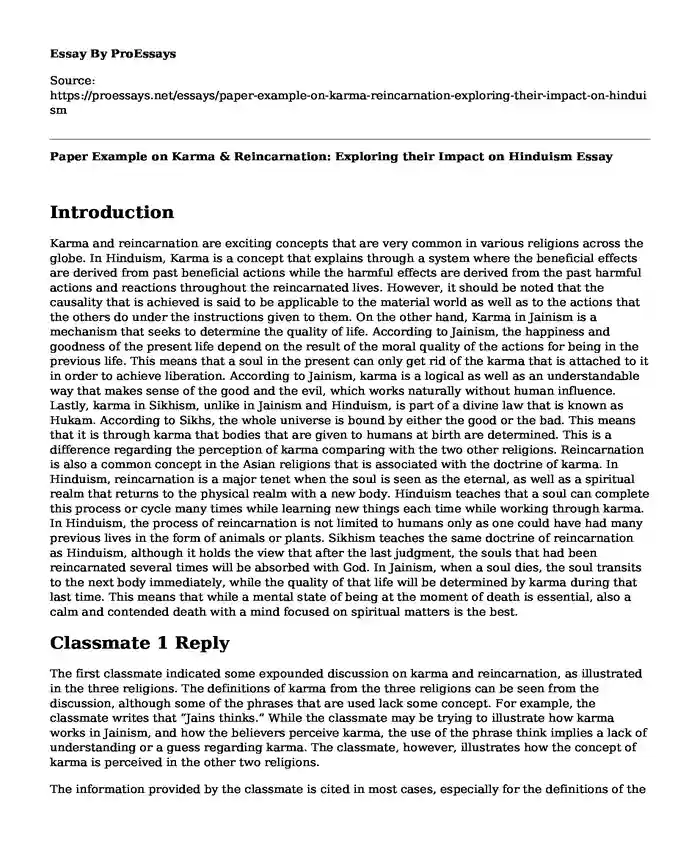Introduction
Karma and reincarnation are exciting concepts that are very common in various religions across the globe. In Hinduism, Karma is a concept that explains through a system where the beneficial effects are derived from past beneficial actions while the harmful effects are derived from the past harmful actions and reactions throughout the reincarnated lives. However, it should be noted that the causality that is achieved is said to be applicable to the material world as well as to the actions that the others do under the instructions given to them. On the other hand, Karma in Jainism is a mechanism that seeks to determine the quality of life. According to Jainism, the happiness and goodness of the present life depend on the result of the moral quality of the actions for being in the previous life. This means that a soul in the present can only get rid of the karma that is attached to it in order to achieve liberation. According to Jainism, karma is a logical as well as an understandable way that makes sense of the good and the evil, which works naturally without human influence. Lastly, karma in Sikhism, unlike in Jainism and Hinduism, is part of a divine law that is known as Hukam. According to Sikhs, the whole universe is bound by either the good or the bad. This means that it is through karma that bodies that are given to humans at birth are determined. This is a difference regarding the perception of karma comparing with the two other religions. Reincarnation is also a common concept in the Asian religions that is associated with the doctrine of karma. In Hinduism, reincarnation is a major tenet when the soul is seen as the eternal, as well as a spiritual realm that returns to the physical realm with a new body. Hinduism teaches that a soul can complete this process or cycle many times while learning new things each time while working through karma. In Hinduism, the process of reincarnation is not limited to humans only as one could have had many previous lives in the form of animals or plants. Sikhism teaches the same doctrine of reincarnation as Hinduism, although it holds the view that after the last judgment, the souls that had been reincarnated several times will be absorbed with God. In Jainism, when a soul dies, the soul transits to the next body immediately, while the quality of that life will be determined by karma during that last time. This means that while a mental state of being at the moment of death is essential, also a calm and contended death with a mind focused on spiritual matters is the best.
Classmate 1 Reply
The first classmate indicated some expounded discussion on karma and reincarnation, as illustrated in the three religions. The definitions of karma from the three religions can be seen from the discussion, although some of the phrases that are used lack some concept. For example, the classmate writes that “Jains thinks.” While the classmate may be trying to illustrate how karma works in Jainism, and how the believers perceive karma, the use of the phrase think implies a lack of understanding or a guess regarding karma. The classmate, however, illustrates how the concept of karma is perceived in the other two religions.
The information provided by the classmate is cited in most cases, especially for the definitions of the concepts that are not common knowledge. Another important point to note is that the classmate illustrates the relationship of karma with reincarnation, especially for Sikhism. On the last bit, the classmate gives his opinion regarding how the three religions perceive karma and reincarnation. This information is an important take away from the discussion illustrated.
Classmate 2 Reply
The second classmate gives a brief explanation of karma and how it is perceived in the three religions. However, the classmate fails to provide a clear definition of karma and reincarnation on the three religions. The discussion of karma, according to the Hinduism religion as illustrated by a classmate is shall. For example, he indicates that Hinduism believes that karma is a cause and effect. Although this could be true in some way, there would be a need to discuss more in detail and illustrate what results from what action or event.
Conclusion
The discussion of karma regarding the Jainism religion is not clear as the classmate does not clearly illustrate the actual cause and effect and the key themes expressed by the religion regarding karma. It would also be more illustrative if more details were given and a comparison of those details made to facilitate a deeper understanding of the concept. Instead of saying that Sikhism is more like Hinduism, the classmate would have instead expressed how karma is explained in the two religions, and how it is similar to phased on the concepts and beliefs. While it is true that all the religions are related regarding their perception of karma, there is a need to demonstrate that in the discussion.
Cite this page
Paper Example on Karma & Reincarnation: Exploring their Impact on Hinduism. (2023, Sep 28). Retrieved from https://proessays.net/essays/paper-example-on-karma-reincarnation-exploring-their-impact-on-hinduism
If you are the original author of this essay and no longer wish to have it published on the ProEssays website, please click below to request its removal:
- A Letter to Bartolome de las Casas in Response to His Book
- Analysis According to Catholic Social Teaching Principles: End of Life With Dignity and Respect
- Approaching the Question of God's Existence - Paper Example
- The Indian Religious Culture Essay Example
- Reflection Essay Sample on the Treatment of Women in Islam
- Essay Example on God's Image: Christianity Enhances Society's Morality
- Paper Sample on Islamic Investment: Linking Religion & Secular Practices







